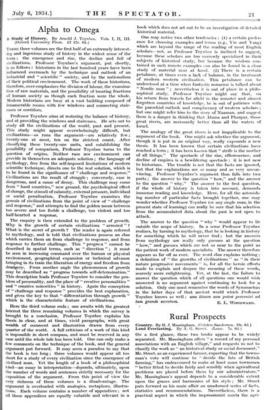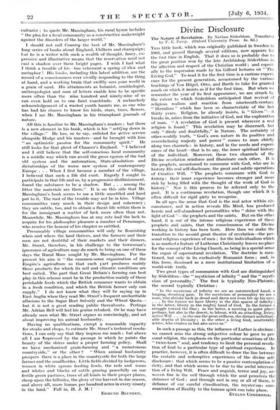Rural Prospects
ON a first glance, these two books appear to be widely
separated. Mr. Massingham offers " a record of my personal associations with an English village," and requests us not to classify the work as " an historical study or social document," Mr. Street, as an experienced farmer, expecting that the towns- man's vote will continue to " decide the fate of British farming," has endeavoured to make at least some townsmen "better fitted to decide fairly and sensibly when agricultural problems are placed before them by our administrators." Mr. Massingham's appeal depends to a considerable extent upon the graces and harmonies of his style ; Mr. Street puts forward as his main affair an unadorned series of facts, statistics and recommendations. Nevertheless, there is a practical aspect in which the impressionist meets the agri- eulturist : to quote Mr. Massingham, his rural hymn includes " the plea for a local community as a constructive makeweight against the disorders of the larger world."
I should not call Country the best of Mr. Massingham's long series of books about England, Chiltern and champaign; but he is a writer with such a wealth of thought, fancy, ex- pressive and illustrative means that the reservation need not east a shadow over these bright pages. I wish I had what I think a trouble of his—too vehement a spring of idea and metaphor ! His books, including this latest addition, are the record of a consciousness ever vividly responding to the thing at hand, and a working brain that swiftly sees your world in a grain of sand. His attainments as botanist, ornithologist, anthropologist and man of letters enable him to be specific more often than the nine hundred and ninety-nine of us can even hold on to one faint exactitude. A melancholy acknowledgement of a wasted youth haunts me, as one who has had his chance to know his birds, stars, trees, flowers, when I see Mr. Massingham in his triumphant journals of nature.
All this is familiar to Mr. Massingham's readers ; but there is a new element in his book, which is his " settyng down in the village." He has, so to say, enlisted for aAtive service alongside Hodge and his masters—and he brought with him " an optimistic passion for the community spirit." He still looks for that ghost of Chaucer's England. " I believed and I still believe that the self-conscious local community is a middle way which can avoid the gross egoism of the bad old system and the automatism, State-absolutism and dictatorships of the worse new system of contemporary Europe . . . When I first became a member of the village, I believed that such a life did exist. Eagerly I sought to participate in that life and so, by a progressive disillusionment, found the substance to be a shadow. But . . . among the litter the materials are there." It is on this side that Mr. Massingham's book seems to me a little unsettled and hard put to it. The root of the trouble may not be in him. Village communities vary much in their design and coherency ; they are subtle, too, and to obtain a fluent life within them is for the immigrant a matter of luck more often than not. Meanwhile, Mr. Massingham has at any rate had the luck to acquire for his philosophic pleasure a number of Personages, who receive the honour of his chapter so entitled.
Presumably village communities will only be flourishing when and where the land thrives, and the farmers and their men are not doubtful of their markets and their dinners. Mr. Street, therefore, in his challenge to the townsman's ignorance of agriculture may do much to bring on one of these days the Rural Muse sought by Mr. Massingham. For the present his aim is " the common-sense organization of the Empire's agriculture so that each Fart produces mainly those products for which its soil and climatic conditions are best suited. The part that Great Britain's farming can best play in this scheme must be in the production mainly of those perishable foods which the British consumer wants to obtain in a fresh condition, and which the British farmer only can supply." I do not know what they will be saying up in East Anglia when they read Mr. Street's frequent uncharitable allusions to the Sugar Beet Subsidy and the Wheat Quota— but it is not a great reading public thereabouts. Perhaps Mr. Adrian Bell will feel his genius rebuked. Or he may have already seen what Mr. Street argues so convincingly, and set about improving his animal husbandry.
Having no qualifications, except a reasonable capacity for steaks and chops, to estimate Mr. Street's technical resolu- tions, I can only say that they impress me much ; but above all I am P.npressed by the passage in which he paints the beauty of the shires under a proper farming policy. Shall we have mechanized grain-farming and " a monotonous countryside," or the other ? " When animal husbandry prospers there is a place in the countryside for both the large farmer and the smallholder. Little fields divided by hedgerows, women in white aprons feeding fowls, the reds and roans and whites and blacks of cattle grazing peacefully on our fertile green pastures, trees of all kinds in their proper places, sheep upon the hillsides, the glory of the harvest in due season, and above all, more homes per hundred acres-in-every county in the land." Fall in, H. J. M. f • • •
EDMUND BLUNDEN.











































 Previous page
Previous page